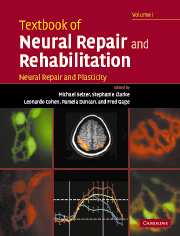Book contents
- Frontmatter
- Contents
- Contents (contents of Volume II)
- Preface
- Contributors (contributors of Volume I)
- Contributors (contributors of Volume II)
- Neural repair and rehabilitation: an introduction
- Section A Neural plasticity
- Section A1 Cellular and molecular mechanisms of neural plasticity
- Section A2 Functional plasticity in CNS system
- Section A3 Plasticity after injury to the CNS
- Section B1 Neural repair
- 16 Neuronal death and rescue: neurotrophic factors and anti-apoptotic mechanisms
- 17 Axon degeneration and rescue
- 18 Adult neurogenesis and neural precursors, progenitors, and stem cells in the adult CNS
- 19 Axon guidance during development and regeneration
- 20 Synaptogenesis
- Section B2 Determinants of regeneration in the injured nervous system
- Section B3 Promotion of regeneration in the injured nervous system
- Section B4 Translational research: application to human neural injury
- Index
18 - Adult neurogenesis and neural precursors, progenitors, and stem cells in the adult CNS
from Section B1 - Neural repair
Published online by Cambridge University Press: 05 March 2012
- Frontmatter
- Contents
- Contents (contents of Volume II)
- Preface
- Contributors (contributors of Volume I)
- Contributors (contributors of Volume II)
- Neural repair and rehabilitation: an introduction
- Section A Neural plasticity
- Section A1 Cellular and molecular mechanisms of neural plasticity
- Section A2 Functional plasticity in CNS system
- Section A3 Plasticity after injury to the CNS
- Section B1 Neural repair
- 16 Neuronal death and rescue: neurotrophic factors and anti-apoptotic mechanisms
- 17 Axon degeneration and rescue
- 18 Adult neurogenesis and neural precursors, progenitors, and stem cells in the adult CNS
- 19 Axon guidance during development and regeneration
- 20 Synaptogenesis
- Section B2 Determinants of regeneration in the injured nervous system
- Section B3 Promotion of regeneration in the injured nervous system
- Section B4 Translational research: application to human neural injury
- Index
Summary
Introduction
Over most of the past century of modern neuroscience, it was thought that the adult brain was completely incapable of generating new neurons or having neurons added to its complex circuitry. However, in the last decade, the development of new techniques has resulted in an explosion of new research showing that neurogenesis, the birth of new neurons, normally occurs in only two regions of the adult mammalian brain, and that there are significant numbers of multipotent neural precursors, or “stem cells”, in many parts of the adult mammalian brain (Reynolds et al., 1992; Lois and Alvarez-Buylla, 1993; Palmer et al., 1995).
The idea of “making new neurons” is appealing for neurodegenerative disease or selective neuronal loss – whenever neurons are lost causing chronic neurological or psychiatric disorders. As is so often the case in science, however, the path from the intuitive idea and first reports of general feasibility to clinical realization has turned out to be a long one. However, contrary to previously widely held beliefs, we now know that the brain itself demonstrates how new neurons can be generated from neural precursors (“neurogenesis”) (Altman and Das, 1965; Altman, 1969; Cameron et al., 1993; Eriksson et al., 1998). One goal of neural precursor biology is to learn from this regionally limited, constitutive neurogenesis how to manipulate neural precursors toward therapeutic neuronal repopulation. Elucidation of the relevant molecular controls might allow both control over transplanted precursor cells and the development of neuronal replacement therapies based on the recruitment of endogenous cells.
Keywords
- Type
- Chapter
- Information
- Textbook of Neural Repair and Rehabilitation , pp. 303 - 325Publisher: Cambridge University PressPrint publication year: 2006

